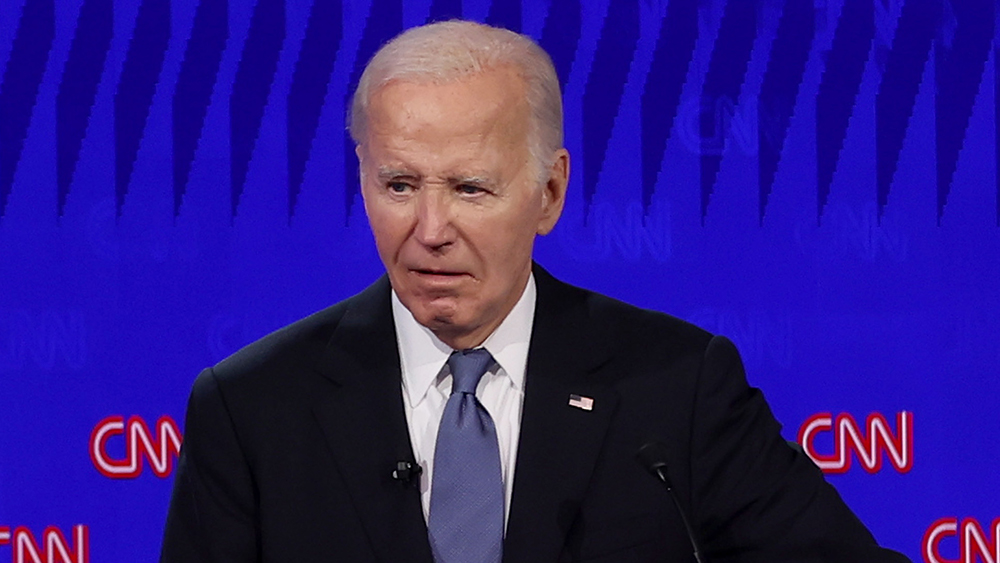Del Monte’s bankruptcy: The fall of a canned food empire
07/13/2025 / By Ava Grace

- Del Monte Foods, a 140-year-old canned food giant, filed for Chapter 11 bankruptcy on July 2. It seeks debt restructuring and asset sales, while securing $900 million in emergency financing to continue operations.
- The company’s struggles stem from shifting consumer preferences (away from processed foods), grocery inflation favoring store brands and rising costs due to tariffs (e.g., 50 percent steel tariffs increasing aluminum can expenses).
- Del Monte’s $912.5 million debtor-in-possession loan includes $165 million in new funding, but its U.S. workforce (5,000 to 10,000 employees) faces uncertainty as subsidiaries remain unaffected.
- The bankruptcy reflects broader economic pressures, with May 2025 seeing 733 Chapter 11 filings driven by rising borrowing costs, geopolitical tensions and resumed student loan payments.
- Once a pantry staple, Del Monte’s fate highlights the struggles of legacy food brands to adapt, with potential outcomes including acquisition, dismantling or further decline as consumer demand shifts.
Del Monte Foods, one of America’s oldest and most iconic food companies, has filed for bankruptcy after nearly 140 years in business.
The California-based canned food giant announced on July 2 that it had commenced Chapter 11 proceedings in New Jersey federal court. Del Monte seeks to restructure its debt and sell off assets with the filing.
With $900 million in emergency financing secured, the company insists this is a strategic move, not a surrender. But the filing raises urgent questions about the future of American manufacturing, shifting consumer tastes and the economic policies that may have hastened Del Monte’s decline.
Founded in 1886, Del Monte was once the world’s largest fruit and vegetable cannery. The company pioneered mass-produced food preservation, with its canned pineapples, peaches and green beans became pantry staples for generations of Americans. But today, Del Monte – which owns brands like Contadina, College Inn and Joyba – is buckling under financial strain. (Related: Rite Aid to close up to 500 stores in BANKRUPTCY proposal.)
Chapter 11 bankruptcy allows a company to keep operating while reorganizing debts, but Del Monte’s decision to sell off assets suggests deeper trouble. The move comes amid a broader surge in corporate bankruptcies, with 733 Chapter 11 filings in May alone – a sign of mounting economic instability. Several factors contributed to Del Monte’s downfall:
- Changing consumer preferences: Younger shoppers increasingly reject processed, preservative-heavy foods in favor of fresh or organic options. Brands like Take Root Organics, owned by Del Monte, couldn’t offset plummeting demand for traditional canned goods.
- Grocery inflation and store brands: As food prices soared, budget-conscious consumers turned to cheaper private-label alternatives, squeezing Del Monte’s profit margins.
- Tariffs and supply chain costs: President Donald Trump’s June 2025 steel tariffs, doubling to 50 percent drove up the price of aluminum cans – a critical expense for Del Monte. The company also faced legal battles over debt restructuring, adding $4 million in annual interest costs.
What’s next for Del Monte?
Del Monte secured $912.5 million in debtor-in-possession (DIP) financing, a type of emergency loan for bankrupt companies, to keep operations running during the sale process. About $165 million is new funding, while the rest refinances existing debt.
CEO Greg Longstreet framed the bankruptcy as a “strategic step forward,” but critics argue it’s a last-ditch effort to salvage a sinking ship. Foreign subsidiaries remain unaffected, but its U.S. workers (5,000 to 10,000 employees) face uncertainty.
Del Monte isn’t alone. The American Bankruptcy Institute reported 2,695 commercial bankruptcies in May, an eight percent monthly increase. “Businesses are under immense pressure,” said Michael Hunter of Epiq AACER.
The already-struggling canned food industry now faces higher production costs due to tariffs, potentially passing those expenses to consumers. The company hopes a new owner will revive its brands, but the path forward is unclear. Competitors like Conagra may swoop in, or private equity could dismantle the company piecemeal.
Either way, Del Monte’s fate reflects a larger trend. Traditional American food giants are struggling to adapt in a rapidly changing market. Del Monte’s bankruptcy is more than a corporate failure – it’s a symbol of shifting economic and cultural tides.
Watch this video about U.S. corporations facing financial turmoil at record pace.
This video is from The Talking Hedge channel on Brighteon.com.
More related stories:
How canned foods are poisoning us.
Avoid these 7 mistakes when buying canned foods.
Food storage tips: How to store canned foods safely.
Sources include:
Submit a correction >>
Tagged Under:
bankruptcy, bankruptcy filing, Bubble, business, Chapter 11, corporations, debt bomb, debt collapse, del monte, economic riot, finance riot, food collapse, food supply, market crash, risk
This article may contain statements that reflect the opinion of the author
RECENT NEWS & ARTICLES
COPYRIGHT © 2017 COLLAPSE.NEWS
All content posted on this site is protected under Free Speech. Collapse.news is not responsible for content written by contributing authors. The information on this site is provided for educational and entertainment purposes only. It is not intended as a substitute for professional advice of any kind. Collapse.news assumes no responsibility for the use or misuse of this material. All trademarks, registered trademarks and service marks mentioned on this site are the property of their respective owners.




















